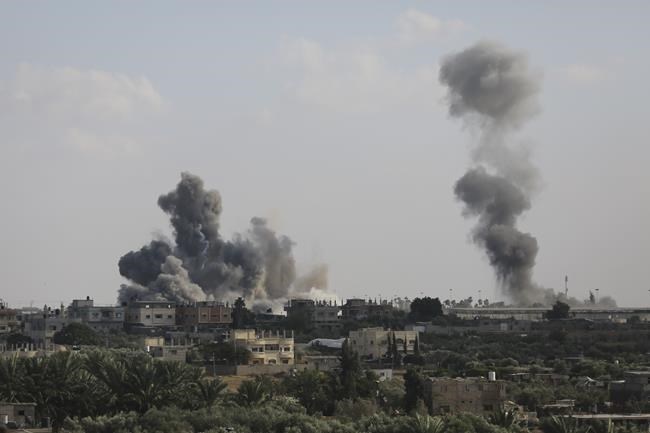TORONTO — Mental health experts and school boards say many kids and teens may be struggling with fear, anxiety or confusion about the Israel-Hamas war and are offering parents tips on how to talk about it.
"We serve many students, staff and communities, including Jewish, Palestinian and Israeli, who have been impacted by decades of conflict in the region," the Toronto District School Board said in a statement emailed to parents and caregivers Tuesday.
Students may be exposed to "horrible images of war" through news reports and social media, Canada's largest school board said, advising parents and students that mental health supports are available in schools and in the community.
"Individuals will be impacted differently based on their lived experiences, and we know that some students and staff may need extra support in the days and weeks ahead," said a similar statement from the Ottawa-Carleton District School Board.
Both school boards directed parents and caregivers to online resources on how to talk to kids about tragic events.
The Toronto school board's web page suggested beginning the conversation by asking kids an open-ended question about how they feel, instead of making assumptions.
Those open-ended questions — along with really listening to the answers — are important, said the senior director of counselling for Kids Help Phone, a national helpline for children and youth.
"If I name a feeling and say, 'Are you scared?' it's really easy (for them) to say, 'Yeah, yeah, scared is a good word,' and it kind of can shut down the conversation," Diana Martin said.
"But if instead I ask somebody, 'How are you feeling about that?' it gives them the ability to actually use their words and then be able to talk about what that means," she said.
"Maybe their word is 'freaked out,' or maybe their word is 'numb' or maybe their word is 'confused' and then we can actually dig into what that's like for them."
Although it's too early for data on whether or not kids and teens called or texted Kids Help Phone about the war over the last few days, usage tends to increase when world crises happen, said Martin, noting that happened with the conflict in Ukraine.
Talking to kids openly about the impact of news stories, images and videos is critical, she said.
Some kids may want to know what's happening, but find it less upsetting to hear it from their parent or caregiver than seeing the news themselves, she said.
Those who find it helpful to read articles may benefit from limiting exposure to disturbing images and videos.
Parents and caregivers should also be mindful of what children overhear, Martin said.
"This is not about never talking about something, but it's also being really aware as an adult about how you're talking about it and what you're saying and if you're watching news on TV or on the internet," she said, also suggesting adults refrain from viewing disturbing visual content near young children.
If children or teens are anxious about what they're seeing and hearing, parents and caregivers can also talk them through self-care and ways to calm themselves, Martin said.
"(Talk about) times when they're not feeling anxious or scared or worried, and how can they use those things to channel some of their energy to help deal with some of the stress," she said, noting that could mean spending time with friends, playing music, sports or creating art.
If kids have friends or classmates at school who are distressed and have loved ones caught in the conflict, parents can talk about ways they can help friends going through a hard time.
Those can include checking in with their distressed friend, spending extra time with them at recess, or making them laugh.
Sometimes, young people don't talk about a war itself, but the conflict triggers feelings about other traumas or experiences, such as a sick relative or problems with classmates, she said.
"Once they're in that emotion, sometimes the other things that are happening in their life can come out."
The Toronto District School Board also counselled parents and caregivers to be ready for that.
"Be aware that new stresses may open old wounds. When a child is confronted with a crisis, losses and upsets from the past may be remembered. The child may or may not wish to talk about these old issues," its web page said.
And if a child doesn't want to talk to their parents about their distress, that doesn't mean the parents are doing anything wrong, Martin said.
It can be an opportunity to talk about other "safe adults" in their children's lives they can turn to, including other family members, friends, teachers, coaches or a helpline.
"It's OK," Martin said. "I always tell people my kids have the number to Kids Help Phone because I know that they're not always going to talk to me."
This report by The Canadian Press was first published Oct. 10, 2023.
Canadian Press health coverage receives support through a partnership with the Canadian Medical Association. CP is solely responsible for this content.
Nicole Ireland, The Canadian Press



